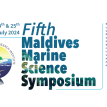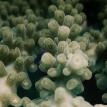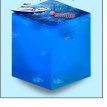EU-Suported Wetland Conservation and Coral Reef Monitoring Project - EU-WCCM Project
12 May 2014
The 1998 mass coral-bleaching event marked the start of efforts to nationally coordinate coral reef monitoring in the Maldives. Since then the government has supported a National Coral Reef Monitoring Programme where some 15 sites have been monitored on a regular basis. The results have provided an excellent time series of substrate cover useful for managing the reefs. However, there are limits to what is possible using the human and financial resources available to government.
The importance of coral reefs to Maldives cannot be over-stated - the very existence of our islands depends on the production and replenishment of coral sand and rubble from living coral reefs. Both tourism and reef fisheries also depend, to a significant extent, on the health of our coral reefs.
We know that coral reefs are extremely vulnerable to climate change, particularly to elevated sea-surface temperatures. They may also be vulnerable to ocean acidification. If we are to safeguard our homes, our tourism related livelihoods and our food security we need to better understand the changes taking place in our coral reef ecosystems. We need to monitor the coral reefs for longer periods of time to generate the evidence based research to guide our management decisions. To this end a broad spectrum of ecosystem changes need to be monitored regularly, over large areas and in a consistent and cost-effective way.
The European Union and Australia currently support the Maldives Climate Change Trust Fund. The Fund is administered by the Climate Change Advisory Council and the Ministry of Environment and Energy. The Fund supports the Wetland Conservation and Coral Reef Monitoring for Adaptation to Climate Change (WCCM) Project. Part of this Project supports the development of the National Coral Reef Monitoring Programme with an emphasis on increasing participation by Resorts and Dive Centers. Sixteen protocols have been developed ranging from sea-level inundation to reef fish consumption that will be monitored in a systematic way. An online web-enabled database will be developed to allow entry of the monitoring data. The Project is expected to generate the scientific evidence necessary for us to better understand and so more effectively manage our coral reefs.
Project's Newsletters
1. Newsletter #3 - January 2014
2. Newsletter #2 - September 2013
3. Newsletter #1 - June 2013
CORAL NEWSLETTER ISSUE 1 JUNE 2013
Download: CORAL-NEWSLETTER-ISSUE-1-JUNE-2013.pdf | pdf | 4.3 MB | Last Changed: 12 May 2014
CORAL NEWSLETTER ISSUE 2 SEPTEMBER 2013
Download: CORAL-NEWSLETTER-ISSUE-2-SEPTEMBER-2013.pdf | pdf | 1.9 MB | Last Changed: 12 May 2014
CORAL NEWSLETTER ISSUE 3 JANUARY 2014
Download: CORAL-NEWSLETTER-ISSUE-3-JANUARY-2014.pdf | pdf | | Last Changed: 12 May 2014





